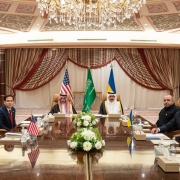Handshakes on the Hudson: Turnbull, Trump and the importance of the personal connection

Malcolm Turnbull will meet Donald Trump for the first time this week. Their meeting on board the museum ship USS Intrepid coincides with the 75th anniversary of the Battle of the Coral Sea. The timing and setting are highly symbolic, emphasising the wartime origins of the ANZUS alliance. Although, as James Curran has pointed out, there’s a risk that meeting in a museum creates a perception of ‘complacency and nostalgia’, of basking in past glories, rather than looking to the future.
Both leaders come to the meeting with agendas. Turnbull will be tempted to talk about the past, and to invest Trump in the history of ANZUS. Trump will be preoccupied with the crises of the present, particularly North Korea and Syria. The history of the alliance is a rich one, and current crises demand attention, but both leaders would be wise to talk about the future: the changing shape of the order in Asia, and how each country plans to respond to it.
Beyond that, the main point of the meeting is to establish a personal relationship between the two men. Trump appears not only to respond to the personal approach but to consider it essential to any partnership. Like an ASEAN meeting, the mere fact that the gathering is taking place is important, especially from Australia’s point of view. There’s already been some disquiet in Canberra that it’s taken this long to happen. Trump may be famously unpredictable, but Turnbull needs to emerge from the meeting better able to predict his actions. Both need to better understand each other’s motivations, priorities and limitations. Personal interaction is invaluable in this regard.
This meeting follows on from a bad start—the now infamous phone call reportedly described by the President as the ‘worst call of all’. However, Vice President Mike Pence’s recent successful visit to Sydney appears to have settled the so-called refugee deal, leaving Turnbull and Trump free to move on to larger matters.
In the wake of the phone call, some argued that the leader-to-leader relationship is but one facet of a broader and deeper alliance, the inference presumably being that it doesn’t matter much whether prime ministers and presidents get along. That’s risky thinking. While too much shouldn’t be read into the phone call, the relationship is important. The leaders are the alliance’s custodians. They have a unique ability to shape it, and the relationship between them is highly relevant to that.
The only time the alliance was in real peril was when relations between Gough Whitlam and Richard Nixon frayed following Whitlam’s criticism of the American bombing of Hanoi in 1972, and deteriorated to the point that Nixon directed that Whitlam be snubbed and ordered a review of all intelligence sharing with Canberra. On the other hand, the benefits can be real when the relationship is good. For example, John Howard’s ability to secure a higher level of access to US intelligence was attributed to the personal intervention of President George W Bush after the two leaders had developed a strong working association and friendship.
For Australian prime ministers, effective management of ANZUS is an essential component of the job. Both their colleagues and the public expect it. To achieve it, diplomats and advisers brief the PM, but there comes a point when it comes down to the two leaders, and Turnbull’s well aware of that.
The idea that a prime minister and president might be friends started with Harold Holt and Lyndon Johnson. Their relationship was spontaneous and sincere and came to be envied by Holt’s successors. John Gorton even left his schedule open during his 1968 visit to Washington in the hope that LBJ might extend their meeting to offer him an impromptu and ‘unceremonious’ sandwich, as he had to Holt the year before. Gorton’s sandwich never came. Genuine friendship is rare and can’t be forced, but it isn’t necessary for good alliance management. In Holt’s case, there came to be a perhaps unfair, but pervasive, perception that the friendship became almost apostolic. Some argue that hints of this were also evident in the Howard–Bush relationship.
More important than friendship is respect between leaders, and more important still is their understanding of the other’s character and temperament as well as where their national and political interests lie, and those aren’t always the same.
Turnbull has at least one advantage: he can learn from the examples of other world leaders. He’d do well to look to Japanese Prime Minister Abe, who, as Nick Bisley notes, spoke to Trump primarily about family and concentrated on the personal connection and a round of golf before turning to policy. Turnbull and Trump are unlikely to be driving golf balls into the Hudson River, but Turnbull seems to already be working on the assumption that the President is as susceptible to charm as he is sensitive to criticism.
In a recent Facebook Live interview, Turnbull praised Trump, noting that he’s ‘a remarkable politician’ who comes ‘from a completely unique background, completely non-political’. Turnbull also came to politics from a non-political background. His past lives as a lawyer, a journalist and one of Sydney’s leading business figures may give him an edge in dealing with a president who until recently was a property developer and reality TV star. While they are very different men, concentrating on what they have in common may be the key for Turnbull in dealing with Trump.

